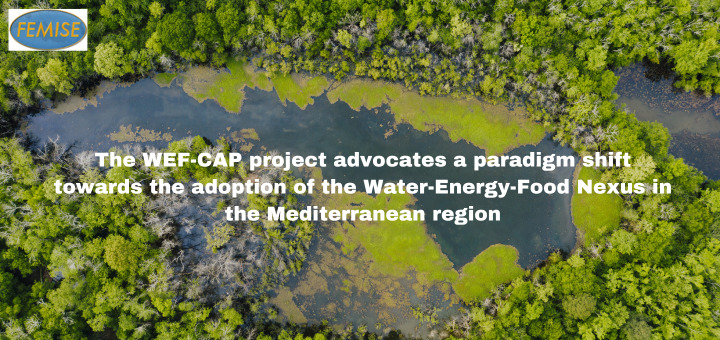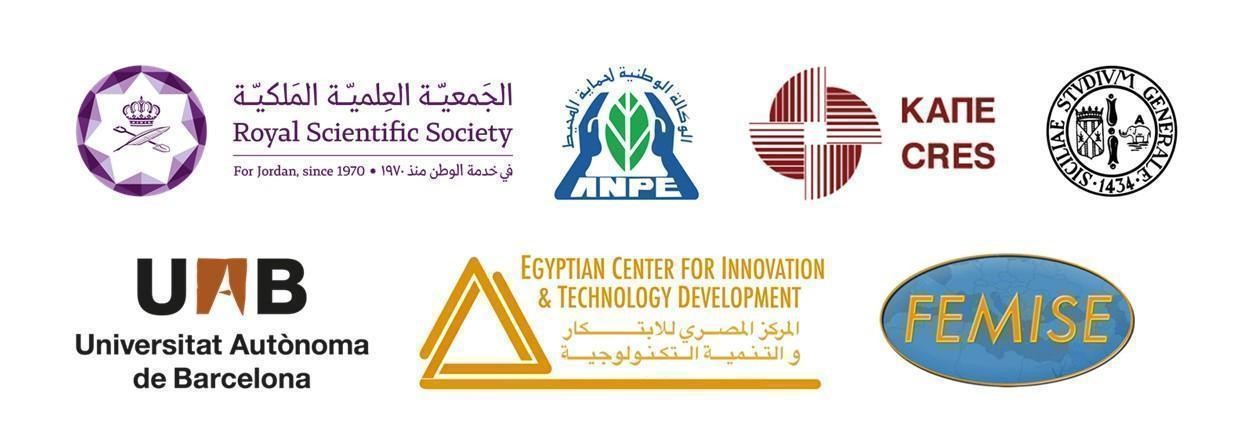 The Southern Mediterranean region is one of most affected regions in the world by the adverse effects of climate change. Rising temperatures, extreme weather conditions, droughts and decreasing water resources affect crops with a significant drop in yields. Countries in the region have to grapple with extreme water stress, falling below the absolute water scarcity threshold of 500 m3 per capita. This situation is further aggravated by agriculture consuming between 65 and 86% of water compared to only 59% in Europe. According to FAO, the number of severely food insecure people in North Africa has increased from 21.1 million in 2019 to 28.3 million in 2021. The health crisis and the war in Ukraine have worsened an already alarming situation imposing the urgent deployment of measures in the region in favour of the green transition in accordance with the commitments made in 2015 during the Paris Agreement. Some national initiatives for better usages of the region’s scarce water, food and energy resources have been implemented but most are implemented in silos and in a non-conducive environment marked by fragmented management of resources. There is an urgent need to adopt a new approach that is promoting an integrated approach to the governance of the Water-Energy-Food Nexus (WEFN) which has the potential to improve resource use efficiency while decreasing pressures on the environment and natural resources. The positive impact of the WEF integrated approach is evidenced both in research and in practice.
The Southern Mediterranean region is one of most affected regions in the world by the adverse effects of climate change. Rising temperatures, extreme weather conditions, droughts and decreasing water resources affect crops with a significant drop in yields. Countries in the region have to grapple with extreme water stress, falling below the absolute water scarcity threshold of 500 m3 per capita. This situation is further aggravated by agriculture consuming between 65 and 86% of water compared to only 59% in Europe. According to FAO, the number of severely food insecure people in North Africa has increased from 21.1 million in 2019 to 28.3 million in 2021. The health crisis and the war in Ukraine have worsened an already alarming situation imposing the urgent deployment of measures in the region in favour of the green transition in accordance with the commitments made in 2015 during the Paris Agreement. Some national initiatives for better usages of the region’s scarce water, food and energy resources have been implemented but most are implemented in silos and in a non-conducive environment marked by fragmented management of resources. There is an urgent need to adopt a new approach that is promoting an integrated approach to the governance of the Water-Energy-Food Nexus (WEFN) which has the potential to improve resource use efficiency while decreasing pressures on the environment and natural resources. The positive impact of the WEF integrated approach is evidenced both in research and in practice.
The WEF-CAP project (Technology Transfer and Capitalization of Water Energy Food Nexus) funded by the European Union under the ENI CBC MED programme (September 2021- September 2023) delivers its guidelines by analyzing the impacts of climate change in Mediterranean countries and capitalizing good practices in the production of renewable energies, preservation and recycling of water resources. WEF-CAP aims to strengthen a regional metacluster that promotes cooperation and tech-transfer while mainstreaming policy impact for innovation-driven progress, thus effectively supporting education, research, technological advancement, and innovation.
The project advocates an integrated approach to Water-Energy-Food (WEF) governance by formulating a series of recommendations detailing opportunities and action levers to optimize resources. A series of 6 policy notes (3 policy briefs and 3 white papers) were published within the framework of the project, the main orientations of which were validated by a public consultation carried out in March 2023 to collect first-hand information about the awareness, perception and expectations of the stakeholders with regards to the WEFN and the climate change challenges in general, providing evidence-based operational recommendations on how to move forward and adopt the WEFN approach. In addition, a series of interviews were conducted by both practitioners (3 best practices videos covering 6 WEF projects in the region) and policy makers (3 recommendations videos from policy makers). This wealth of information has provided a better understanding of the challenges facing the region and some of the most relevant and operational recommendations that can be taken further to the policy makers.
The following is some of these recommendations:
1. Creating inter-ministerial WEF committees to support the development of new regulations and policies towards the adoption of WEF Approach.
These inter-ministerial committees will be able to prioritize remedying the inadequacy of the relevant legal framework to ensure transparent, accountable and equitable implementation of WEFN practices while initiating constructive dialogues among different actors involved. The urgency in responding to growing demands in face of scarce resources requires adopting measures with an immediate impact despite the cost, this was suggested by the stakeholders in the public consultation. This is justified by the fact that some of the damages caused by climate change could be irreversible.
As outlined in the first WEF-CAP white paper entitled “Towards the Adoption of an Integrated Water-Energy-Food Nexus approach in Jordan: Challenges & Opportunities”, FEMISE advocates the creation of a Water-Energy-Food-Environment Nexus Council (WEFEN) in Jordan which would be a framework for dialogue favorable to the exchange of good practices relating to the modernization of infrastructures, the increase in agricultural productivity and an increased awareness of water stress in order to achieve a paradigm shift in resource management. Such a Council will support the overall assessment, management and planning of sustainable projects for global green and climate investments with the overall objective of strengthening the Jordanian economy, thereby attracting foreign investors, negotiating with donors and creating much-needed jobs. In Tunisia, the establishment of a WEFN Committee under the aegis of the National Environmental Protection Agency, would help increase policy coherence among the three sectors and climate change policies in order to provide integrated solutions aimed at mitigating nexus-related risks. This committee will provide concrete proposals for Tunisia’s Resilience Strategy in 2030 involving the use of desalination and recycling of wastewater, the promotion of new desalination techniques and the introduction of new intelligent management of resources and the water network of Sonede
2. Using scarce resources more efficiently.
It is clear that one of the major challenges facing southern Mediterranean countries (SMCs) is related to water. In countries like Egypt, Lebanon, Jordan and Tunisia, improving the monitoring and control of water supply and demand management, reducing water losses, promoting water re-usages and finding new sources while adopting strict efficiency measures of energy use in the water sector will contribute to enhancing water security. At the same time, it will be essential to introduce energy and water efficient techniques in food production to ensure sustainable agriculture, which will guarantee food security to satisfy present and future needs. This involves the use of renewable energy for the production of water, water distribution, wastewater treatment and water desalination plants, as well as for the cultivation of crops, irrigation systems, storage, food processing and agro-food industries, which certainly requires the need to move towards a sustainable, stable and strongly connected energy sector.
Stimulating sustainable consumption and production patterns to achieve the Sustainable Development Goals (SDGs) and to mitigate and adapt to climate change obligations and targets. It is essential to raise awareness among the general public of the benefits and significance of adopting an integrated WEFN approach to policy-making while deploying an information program to raise awareness on water scarcity and more generally to change the culture about WEF consumption. This requires active communication through media and government announcements (through traditional media, TV & Radio but also through social media campaigns). Since low prices and general untargeted subsidies in the majority of SMCs have led to domestic overconsumption of resources and lack of incentives to attain resource efficiency, reforming pricing systems would enhance the efficiency of resources, would improve economic and climatic resilience and ease the burden on governments’ budgets.
4. Fostering a culture of innovation and knowledge. Stimulating the innovation activities of small and medium enterprises in the field of WEFN is crucial and requires to strengthen the partnership between the public and private sectors in order to increase the volume of investments in innovation. This involves investing in research and development of new technologies and practices that improve resource efficiency while establishing entrepreneurship programs and initiatives to stimulate and support young entrepreneurs to start new business in the WEF sectors adopting an integrated approach. As outlined in the second WEF-CAP white paper entitled “Technology, Research and Development and Innovation: Towards the adoption of the Water-Energy-Food Nexus in Egypt, Femise recommends that the country encourages the influx of knowledge and expertise while integrating research and innovation and advocating interdisciplinarity in the programs of the WEFN. The need to ensure a motivating environment for innovation would impose the revision of intellectual property legislation and implementation methods to promote the protection principles of knowledge, scientific research, and innovation as well as the improvement of the legal framework for public-private partnerships to facilitate private sector involvement in WEFN research and development.
5. Integrating climate change education in all educational institutions across the SMCs in order to provide the knowledge, skills, values and attitudes necessary for young people to act as agents of change. This requires making climate change education a mandatory part of the national curriculum as a key climate risk mitigation strategy that could potentially be a more effective way to reduce inefficient use of resources. This will contribute to raise public awareness from young age about impact, mitigation and adaptation measures.
6. Raising public trust by promoting transparency and the sharing of credible information. Official data and reports on climate-related risks, essential to support research aimed at improving the understanding and prediction of the climate system and informing decision-making, should also be available and accessible to the general public, as well as to researchers and innovators seeking to find effective solutions to WEF challenges. Results of the public consultation showed a serious gap in knowledge about climate change impact in the region.
7. Increasing investments in training programs to promote sustainable practices while improving skills and knowledge. This involves capacity building workshops and training targeting different groups in different sectors such as policy and decision-makers, professional staff, entrepreneurs, practitioners and workers to support the implementation of an integrated WEFN approach, thereby contributing to creating a culture of sustainability.
8. Strengthening stakeholder engagement and collaboration to overcome the challenges of the WEF and produce better dialogues. Governments and stakeholders in the region should engage with local communities, civil society organizations, international organisations and NGOs and other relevant actors to understand their needs and concerns and integrate their perspectives into decision-making processes thus ensuring social inclusion and equity.
9. At the Regional Level: FEMISE is advocating the establishment of a WEF Mediterranean Council. As the Mediterranean region is facing the same climate related challenges, it is only natural that countries of the region exchange with regards to these challenges and best practices. Within the framework of an integrated governance of the WEFN, MPCs governments should seek further regional cooperation around the WEF, as it will further develop innovative and inclusive solutions in the region ensuring the best use of available resources while contributing to the creation of much needed jobs. Femise recommends including climate change mitigation measures in regional agreements while involving international organizations in financing, technical assistance, knowledge sharing, facilitation of cross-border cooperation and coordination, and capacity building efforts to help local actors better understand and implement the WEFN approach. Youth can play an important role in promoting cooperative solutions and building trust among countries in the region in diplomacy efforts. Femise recommends the creation of a WEF Mediterranean Council which will contribute to better regional coordination while promoting the emergence of a more efficient and sustainable management of resources in the fight against climate change.
The article is available for download by clicking here.


This Article is based on outputs that have been produced in the Context of the WEF-CAP Project (THE TECHNOLOGY TRANSFER AND CAPITALIZATION OF WATER ENERGY FOOD NEXUS) which received financial contribution from the ENI CBC Programme which is supported by the European Union through the Grant Agreement no C_A.2.1_0069 running from 1st of September 2021 to 30th of September 2023.
The views expressed in this article are those of the authors can under no circumstances be regarded as reflecting the position of the European Union or the Programme management structures.
enaires.



